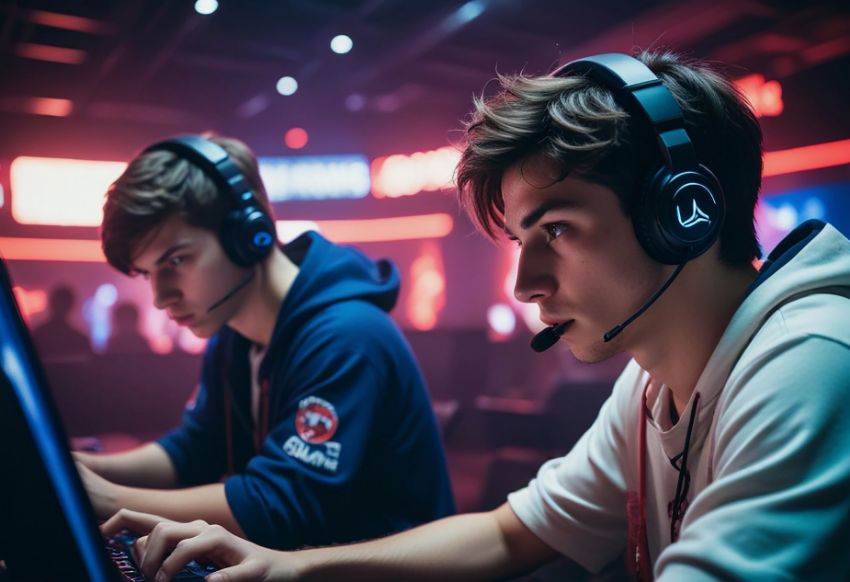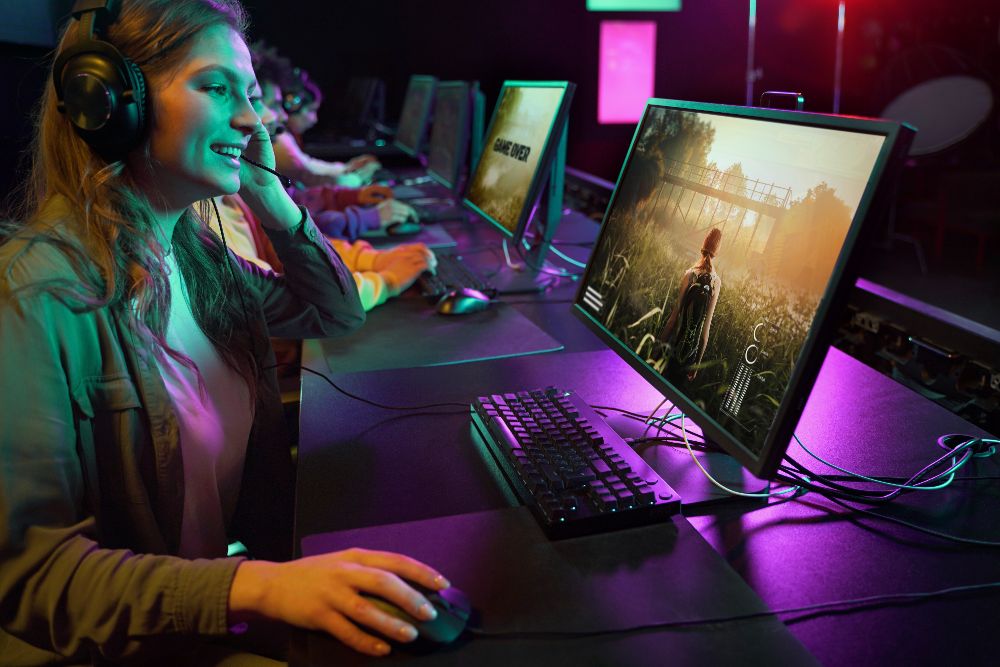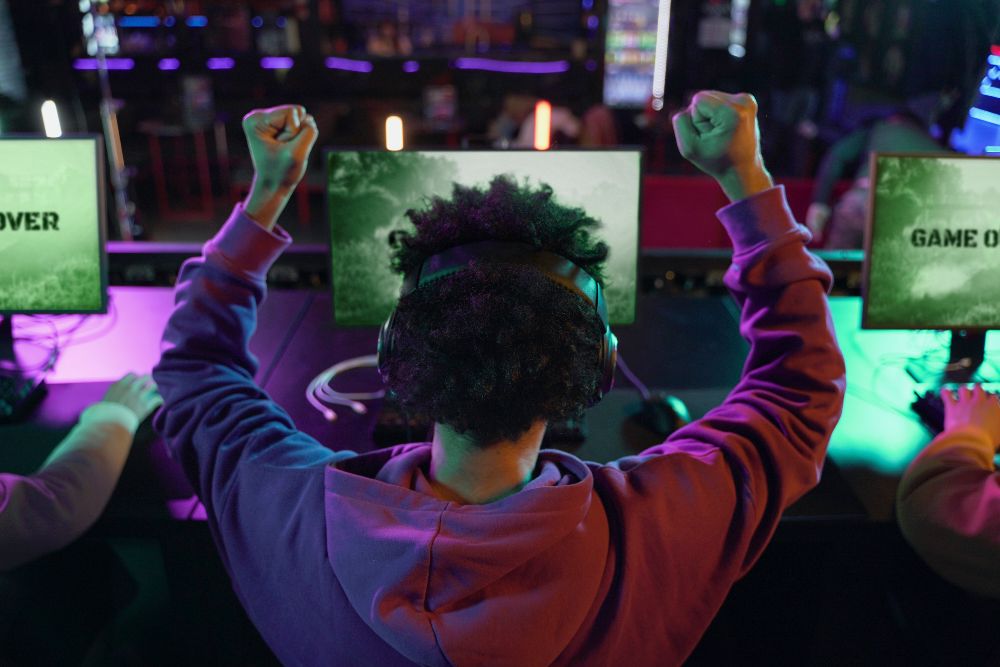Balancing gaming and education can be challenging, but it is feasible with clear priorities and effective time management. Creating a structured schedule that allocates specific times for studying and gaming can help maintain balance.
Utilizing tools such as planners and timers can enhance productivity, ensuring that academic responsibilities are met. Regular breaks and open communication with parents and teachers can provide necessary support.
To manage this balance effectively, it is important to establish a routine that integrates both activities without causing undue stress. Setting boundaries for gaming time and ensuring that it does not interfere with educational commitments is crucial.
Additionally, prioritizing tasks based on deadlines and importance can aid in better time allocation. By adhering to these strategies, one can achieve a balance between gaming and education without feeling overwhelmed.
Key Takeaways
- Set clear priorities with education taking precedence over gaming.
- Create a schedule that slots gaming sessions around academic commitments.
- Designate specific study and gaming times using timers for adherence.
- Utilize time management tools like digital calendars and task management apps.
- Take regular breaks to prevent fatigue and enhance retention without overindulging in gaming.
Set Clear Priorities
Balancing gaming and education begins with setting clear priorities. It’s important to recognize that education should take precedence. This doesn’t necessitate giving up gaming entirely, but rather requires a strategic allocation of time.
Start by identifying your academic goals, such as aiming for a specific GPA or preparing for upcoming exams and projects. Understanding your academic objectives will guide you in determining the necessary time commitment for your studies.
Next, evaluate the role of gaming in your life. Consider your reasons for gaming, whether it serves as a method of relaxation or if you’re pursuing it as a potential professional path. This self-assessment will enable you to allocate your time more effectively.
Prioritize academic tasks like homework and studying before engaging in gaming activities.
With a clear understanding of your priorities, decision-making regarding time management becomes more straightforward. It’s essential to ensure that your academic responsibilities are addressed first, allowing you to enjoy gaming without added stress.
Create a Schedule
To effectively balance gaming and education, you need to create a schedule that prioritizes essential tasks and allocates specific time for each activity.
Start by listing your most important school assignments and deadlines, then slot in your gaming sessions around them.
This way, you can enjoy your games without falling behind on your studies.
Prioritize Essential Tasks
Creating a well-structured schedule can be highly effective in balancing gaming and education. By prioritizing essential tasks, you can ensure that both academic responsibilities and gaming interests receive appropriate attention.
Begin by listing all your tasks for the week, including assignments, study sessions, projects, and other academic commitments. Personal responsibilities such as chores and exercise should also be included.
Next, rank these tasks based on their importance and urgency. High-priority tasks should be addressed first. For instance, an exam scheduled for the next day is more urgent than a gaming session.
Breaking down larger tasks into smaller, manageable components can make them less overwhelming and easier to complete. It is important to be realistic about what can be accomplished in a day. Overloading your schedule can lead to burnout and frustration.
Once you have identified your essential tasks, allocate specific times for them in your weekly plan. This approach ensures that you follow a structured roadmap rather than making daily ad-hoc decisions.
Consistency and dedication are key to maintaining this balance. By prioritizing essential tasks, you can create a routine that supports both academic achievement and gaming activities.
Allocate Specific Time
When balancing gaming and education, setting aside specific times for each activity can be highly effective. By creating a structured schedule, you can ensure that both academic responsibilities and gaming interests receive appropriate attention.
Start by identifying your most productive hours for studying and allocate those times for educational tasks. This allows you to work when you’re most alert and capable of absorbing information efficiently.
Next, designate a specific block of time for gaming. It’s important to treat this time as a reward for completing academic tasks. Ensure that gaming sessions don’t interfere with critical study periods or lead to late nights that could disrupt your sleep schedule. Adhering to these allocated times can help build a balanced routine.
Utilize tools such as calendars or planning apps to visualize your schedule. Setting reminders to indicate the start and end of each activity can aid in maintaining discipline and focus.
Use Time Management Tools
A practical approach to balancing gaming and education is to utilize time management tools. These tools assist in prioritizing tasks and efficiently allocating time. One can start by using a digital calendar or planner to outline the daily schedule. Applications such as Google Calendar or Microsoft Outlook can issue reminders and alerts to help maintain adherence to planned activities.
Task management apps like Todoist or Trello are also beneficial. These applications enable users to list tasks, set deadlines, and deconstruct larger projects into smaller, more manageable steps. This clear visual organization aids in preventing procrastination and maintaining order.
Another useful method is the Pomodoro Technique, which involves working for a fixed period, typically 25 minutes, followed by a brief break. Apps like Focus Booster facilitate the implementation of this technique, promoting productivity while reducing the risk of burnout.
Additionally, distraction-limiting apps can be useful. Applications such as Forest or StayFocusd can block access to gaming sites or apps during study periods, thereby helping to sustain focus.
Integrating these time management tools into one’s routine can make it more manageable to balance gaming interests with educational obligations.
Designate Study and Game Time
To balance gaming and education, you need to establish clear boundaries between study and game time.
Use timers effectively to stick to these boundaries, ensuring you don’t let one activity overshadow the other.
Prioritize important tasks first, so you can enjoy gaming guilt-free afterward.
Establish Clear Boundaries
Establishing clear boundaries is essential for effectively balancing gaming and education. Designating specific times for both activities ensures that neither one encroaches on the other.
Begin by evaluating your daily schedule to determine when you’re most productive for studying, and set that time aside exclusively for your schoolwork. Treat this period as a non-negotiable part of your day.
After establishing your study periods, allocate time for gaming. This structured approach not only aids in staying organized but also makes gaming sessions more satisfying, as they’re contingent upon the completion of educational tasks.
Balance doesn’t imply equal time for both activities; rather, it means allocating appropriate time to each without neglecting responsibilities.
Communicate these boundaries clearly with friends and family, informing them of your study hours to minimize distractions. During gaming periods, set limits to prevent them from overlapping with study time.
Adhering to these boundaries requires discipline but is achievable. With clear boundaries, it’s possible to enjoy gaming time without compromising academic performance.
Use Timers Effectively
After establishing clear boundaries, utilizing timers can be an effective method for managing both study and gaming time. Timers assist in adhering to schedules and maintaining a balance between responsibilities and recreational activities.
A practical approach involves setting a defined period for studying. For instance, using a timer to allocate 45 minutes for study followed by a 10-minute break aligns with the Pomodoro Technique, which has been shown to enhance productivity and reduce the risk of burnout.
Upon completing a study session, another timer can be set for gaming time. Allocating a reasonable duration, such as 30 minutes to an hour, depending on the overall schedule, allows for gaming without compromising academic responsibilities.
It is important for timers to be both visible and audible. Various tools, from apps to traditional kitchen timers, can be used based on personal preference.
Adherence to these timers requires discipline but is crucial for maintaining a balanced routine. Over time, this practice can become habitual, aiding in more efficient time management.
The use of timers isn’t merely about keeping on track but also about fostering a sustainable balance between academic commitments and gaming activities.
Prioritize Important Tasks
Prioritizing tasks is crucial for effectively balancing gaming and education. Begin by listing all your responsibilities, including school assignments, study sessions, and gaming time. Break down your day into manageable segments and allocate specific time slots for each activity.
It’s important to note that schoolwork should take precedence over gaming. Balancing both activities doesn’t necessitate abandoning gaming, but rather requires strategic planning.
Subsequently, set clear objectives for each study session. Having a defined goal helps maintain focus and enhances productivity during study time. Once study tasks are completed, gaming can serve as a reward. This approach can create a positive feedback loop, making the process more sustainable.
Utilize tools such as planners or digital calendars to monitor your schedule. Visual aids can be effective in ensuring adherence to your plan. Additionally, communicating your schedule with family or roommates can help them understand when you require uninterrupted study time and when you’re available for gaming.
Balancing gaming and education is attainable with proper planning and discipline. By prioritizing tasks, you can find time for both activities.
Avoid Procrastination
Balancing gaming and education requires careful time management to avoid procrastination. Delaying academic responsibilities in favor of gaming can result in accumulated tasks, increased stress, and diminished academic performance. To mitigate this, it’s advisable to set specific, attainable objectives for both study periods and gaming sessions.
Developing a structured schedule that designates particular times for studying and gaming can be beneficial. Consistently adhering to this schedule is crucial. Utilizing tools such as calendars or reminder applications can help you stay aware of deadlines and upcoming exams.
It’s important to prioritize tasks based on their deadlines and significance, addressing them sequentially. Dividing extensive projects into smaller, more manageable tasks can reduce the feeling of being overwhelmed and facilitate initiation.
The Pomodoro Technique is another effective method: it involves working for 25 minutes followed by a 5-minute break. This cycle is repeated four times, after which a longer break is taken. This technique helps maintain focus and productivity while providing opportunities for brief gaming sessions.
Stay Focused During Study Time
To maintain focus during study periods, it’s essential to create an environment that minimizes distractions. Begin by selecting a quiet location where interruptions are unlikely. Disable notifications on your phone or place it in a different room. Ensure that your study area is organized, as a clutter-free environment can contribute to mental clarity.
Next, establish clear and realistic objectives for each study session. Divide your tasks into smaller, manageable portions. This approach helps you remain focused and fosters a sense of achievement as you complete each segment. Utilize tools such as timers or productivity apps to adhere to your schedule.
Prioritizing tasks is also crucial. Tackle the most challenging subjects first while your cognitive resources are at their peak. This strategy reduces the likelihood of hastily addressing difficult material later. Keep all necessary study materials within easy reach to minimize disruptions.
Inform family members or housemates about your study schedule and request a quiet environment. By implementing these measures, you can create a conducive setting for concentration, thereby enhancing the productivity of your study sessions.
Take Regular Breaks
Taking regular breaks is crucial for maintaining productivity and preventing burnout. Continuous study sessions can lead to mental fatigue, making it harder to retain information. Brief breaks allow the brain to rest and recharge, which can enhance focus and information absorption upon returning to study tasks.
Following the 25-5 rule—studying for 25 minutes followed by a 5-minute break—can be particularly effective. During these breaks, engaging in activities that differ from studying or gaming, such as stretching, taking a short walk, or eating a healthy snack, can help refresh both the mind and body.
It is also advisable to limit gaming breaks to prevent getting engrossed in lengthy sessions. Setting a timer for these breaks can help ensure a timely return to study activities.
Maintaining a balance between study periods and gaming breaks can contribute to better performance and a more manageable workload.
Communicate With Parents and Teachers
Effective communication with parents and teachers can significantly facilitate balancing gaming and educational responsibilities. Begin by discussing your gaming habits and academic objectives openly. Clarify how gaming serves as a means of relaxation and recharging, while also stressing your dedication to your studies. This approach will demonstrate your intent to maintain a balanced lifestyle.
Involving your teachers is also crucial. Inform them about your gaming interests and the potential for distraction it presents. Seek their advice on time management and maintaining focus on academic tasks. Teachers may offer practical strategies or resources that you mightn’t have previously considered.
Develop a schedule that allocates specific times for both study and gaming. Share this schedule with your parents and teachers to ensure they’re aware of your plan and can assist in holding you accountable. This level of transparency fosters trust and illustrates your sense of responsibility.
Lastly, be receptive to feedback. If parents or teachers observe that gaming is detracting from your educational performance, it’s important to listen to their concerns and adjust your habits as necessary. Effective communication requires a reciprocal approach, and being open to guidance will support the achievement of a balanced lifestyle.
Monitor Your Progress
To keep your balance between gaming and education, start by tracking your study hours and gaming time.
Set achievable goals for both activities to guarantee you’re making steady progress.
Regularly monitor your schedule to see where you might need adjustments.
Track Study Hours
Tracking study hours is critical for effectively balancing gaming and educational commitments. Monitoring the time allocated to studying ensures that academic duties are fulfilled without encroaching on leisure activities.
Begin by establishing specific study objectives for each week and utilize a planner or digital tool to document your hours. This practice provides a clear overview of your progress and helps identify any inconsistencies in your schedule.
Reviewing logged hours daily is advisable. Assess whether you achieved your study goals and, if not, analyze the reasons. Potential factors could include distractions or misjudgment of the time required for certain tasks.
By examining your study habits, you can make more informed decisions about time management. Maintaining consistency is essential. Strive for a balanced schedule with study hours distributed evenly throughout the week.
This approach minimizes last-minute cramming and associated stress. The objective is to establish a sustainable routine that accommodates both productive studying and leisure activities.
Tracking study hours is a foundational step in achieving this equilibrium.
Gaming Time Allocation
Balancing gaming and education requires careful management of gaming time. Monitoring gaming hours is essential to ensure they don’t interfere with academic responsibilities.
One effective approach is to set specific time slots for gaming, ideally after completing study sessions, to use gaming as a reward rather than a distraction.
To track gaming time, consider using tools like timers or gaming apps with built-in time tracking features. Logging daily gaming hours can help in understanding gaming patterns and making necessary adjustments.
If an increase in gaming hours is observed, it’s important to take immediate action by reducing gaming sessions or setting stricter time limits.
Communicating the gaming schedule with family or roommates can also be beneficial. They can provide external accountability and reminders to adhere to the plan.
Consistency in following the gaming schedule is crucial for maintaining a balance between gaming and studying. It isn’t about eliminating gaming but managing it wisely.
Set Achievable Goals
Allocating gaming time effectively is crucial for establishing achievable goals and tracking progress. Begin by identifying specific, realistic objectives for both your education and gaming activities. Educational goals may include completing assignments, dedicating a set number of hours to studying, or mastering a new topic. Gaming goals might involve reaching a new level or completing a challenging quest.
After setting your goals, break them down into manageable tasks. For instance, if your goal is to excel in a test, divide your study material into daily segments. Similarly, if you aim to achieve a particular milestone in a game, organize your gaming sessions to align with this objective. This method maintains focus and mitigates the risk of feeling overwhelmed.
Regularly monitor your progress using tools such as planners or apps to track tasks and mark off completed ones. Reflect on what strategies are effective and which are not. If you find that you aren’t meeting your goals, adjust your plan accordingly. This may involve reallocating more time to studying or incorporating breaks during gaming sessions.
Reward Yourself Wisely
Incorporating a reward system into your study routine can be an effective strategy for enhancing productivity and maintaining motivation. By setting specific academic goals, such as completing a chapter or solving a set of math problems, and rewarding yourself with designated gaming time upon achieving these goals, you create a structured approach to balancing work and leisure. This method not only incentivizes studying but also makes gaming a rewarding activity.
It is crucial to manage the balance between study time and gaming time to ensure that educational priorities remain central. For example, if you study for an hour, consider rewarding yourself with only 30 minutes of gaming instead of matching the time spent studying. This approach helps maintain the primary focus on academic work while still providing a brief period for relaxation and enjoyment.
Selecting appropriate games as rewards is also important. Choosing shorter, less immersive games can prevent extended gaming sessions that might disrupt your study schedule. This approach minimizes the risk of a quick gaming break turning into a prolonged gaming session, thereby ensuring that your study and leisure activities remain balanced.
If you are interested in How to Become a Professional Gamer, read this article:.https://bet-of-the-day.net/2024/10/02/how-to-become-a-professional-gamer/
Conclusion
Balancing gaming and education is totally doable when you set clear priorities and stick to a schedule. Use timers and planners to stay on track, and make sure to take regular breaks to avoid burnout. Communicate openly with your parents and teachers for added support. Monitor your progress and reward yourself wisely for achieving your goals. By following these steps, you can enjoy gaming as a fun break while still excelling in your studies.



